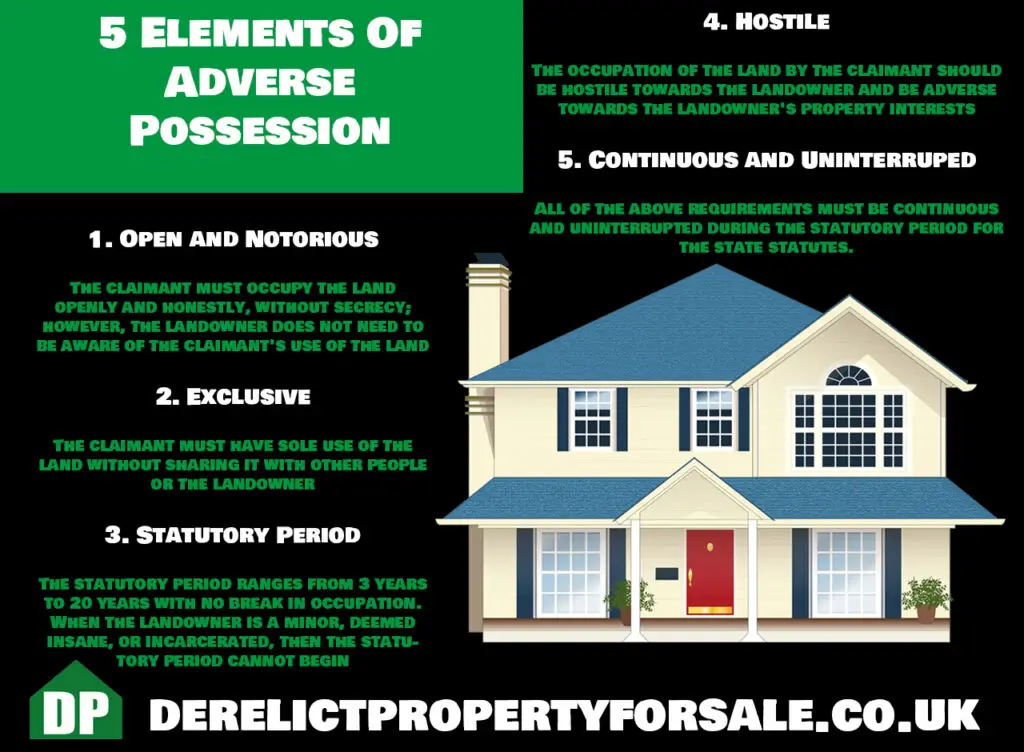What Does Adverse Possession Mean?
Adverse Possession, or squatter’s rights, is the occupation of property or land not owned by them and the ability to acquire legal ownership due to continuous occupation. Possession is not the same as occupation of a property; it refers to who controls the land. Historically, the land is a finite resource, so, in turn, is hugely valuable, unused, unproductive land was wrong. Use it or lose it, as the owner is not fulfilling their ownership duties. Adverse Possession cases can involve residential, commercial, or agricultural land and issues around boundary disputes.
What Are The 5 Elements of Adverse Possession?

The United States considers five elements to meet the requirements of Adverse Possession. The state statutes govern these requirements, and they vary between jurisdictions. These are:
- Open and Notorious – The claimant must occupy the land openly and honestly, without secrecy; however, the landowner does not need to be aware of the claimant’s use of the land
- Exclusive – The claimant must have sole use of the land without sharing it with other people or the landowner
- Hostile – The occupation of the land by the claimant should be hostile towards the landowner and be adverse towards the landowner’s property interests
- Statutory Period – The statutory period ranges from 3 years to 20 years with no break in occupation. When the landowner is a minor, deemed insane, or incarcerated, then the statutory period cannot begin
- Continuous and Uninterrupted – All of the above requirements must be continuous and uninterrupted during the statutory period for the state statutes.
How Long Does Adverse Possession Take?
The Land Registry Act 2002 (LRA) dictates the length of time an Adverse Possession claim takes to complete. For example, suppose the land in question has a named owner on the Land Registry; in that case, an occupier can claim after ten years. However, this period is extended to 12 years for unregistered land due to locating the owner.
How Do You Prove Adverse Possession UK?
- Proving Adverse Possession is threefold, and there are strict deadlines to consider when applying; you must:
- Prove factual possession of the land, whereby you treat the land as your own and have been for the required number of years. The Land Registry will consider this information when making its decision.
- Have the intention to possess the land or animus possidendi; the act of control proves this for the time being.
- Prove that the possession is adverse, meaning that it is without the landlord’s or title owner’s consent.
How Do I Apply For Adverse Possession?
There are two procedures to follow when applying for Adverse Possession, depending on whether the land is registered or unregistered. Firstly, check to see if the land has an owner by accessing the Land Registry online.
Registered Land
- Complete an ADV1 form obtained from the Land Registry
- Include a formal statutory declaration with the application clearly stating the evidence to show adverse possession
- Land Registry will serve notice to the registered owner
- The registered owner responds within 65 days giving consent to the application, serving a counter-notice, or objecting to the application for a specific reason
- If the registered owner serves a counter-notice, the application will not pass the requirements
- The applicant can then consider the statutory conditions, but this will likely fail
- Wait two years to submit a new Adverse Possession claim
Unregistered Land
- Confirm that the property has no owner by completing an index map search
- Complete a land charges search against their name and current or previous owners
- Complete an FR1 form obtained from the Land Registry
- Include a formal statutory declaration with the application clearly stating the evidence to show adverse possession
- Land Registry will serve notice to anyone it considers as having an interest in the land
- If the owner is found and objects to the claim but does not possess the original title deeds, they will have difficulty proving ownership
- Where the Land Registry views the objection as substantiated, both parties will have the opportunity to negotiate
- If negotiations fail, the Land Registry will refer the claim to the First-tier Tribunal (Property Chamber), which may end in court proceedings
- If the claimant is successful, then a possessory title is awarded. The claimant can then receive a full title of ownership after 12 years

How Much Does Adverse Possession Cost UK?
An application for Adverse Possession costs between £70 and £130; the cost will depend on whether the land is registered or not, with the application fee going to the Land Registry. There may also be additional costs for legal fees to prepare witness statements, the application, and a fee to obtain plans and title documents. You can reduce your costs by not using a solicitor and preparing the documents yourself.
How Hard Is It To Prove Adverse Possession?
You must prove that the land in question is used exclusively by you, without objection, and you have physical possession. Claimants can demonstrate physical possession of the land by fencing it off or enclosing the land, preventing access to others. However, this may be unnecessary and will not prevent a claim from being awarded. Recent claimants who have maintained the land during the period in question have succeeded in gaining possession. It proves they have behaved in a way a landowner would.
How Many Adverse Possession Claims Are Successful?
In England and Wales, all Adverse Possession claims are judged on a case-by-case basis. If an application faces no objection, the Adverse Possession claim will be successful. However, if there is a counter-claim submitted, then the Adverse Possession application will be rejected.
- In 2018/2019, approximately 1400 court applications were submitted, with about 1000 cases being successful.
- In 2019/2020, around 1000 court applications were submitted, with about 850 cases being successful.
- In 2020/2021, approximately 170 court applications were submitted, with about 150 cases being successful.
- The significant reduction in court applications and successful cases is likely due to the COVID pandemic and the law against evictions. As a rule of thumb, roughly 50% of claims are successful.
Can You Claim A Derelict Property Through Adverse Possession?
It is possible to claim property through adverse possession, however, it’s no simple, and does take some time. For more information take a look at our post: Can I Claim Derelict Land?
Some useful government resources on adverse possession

